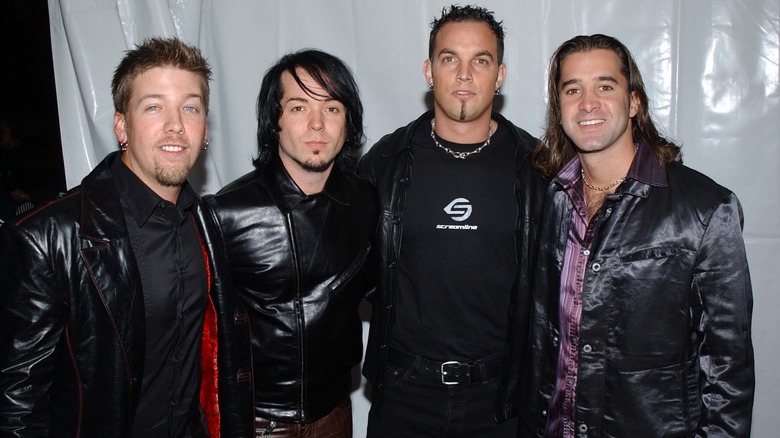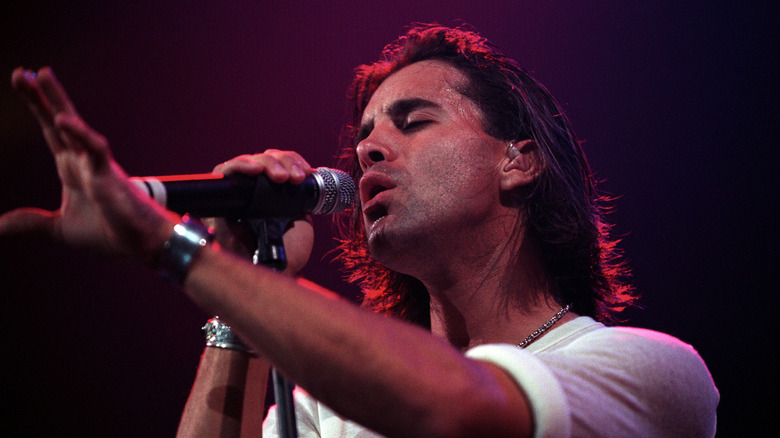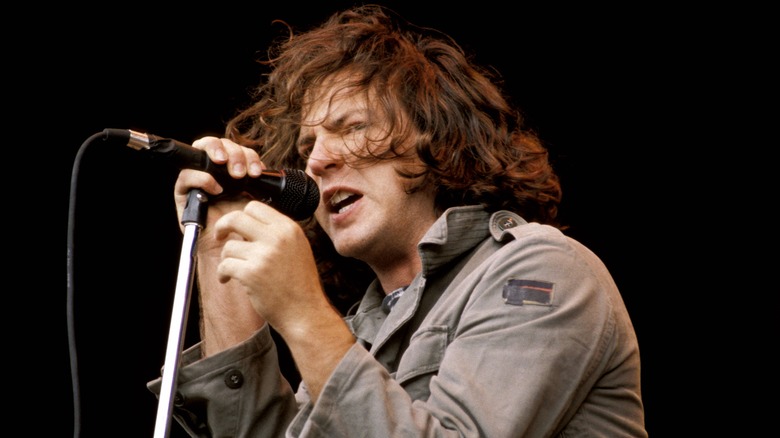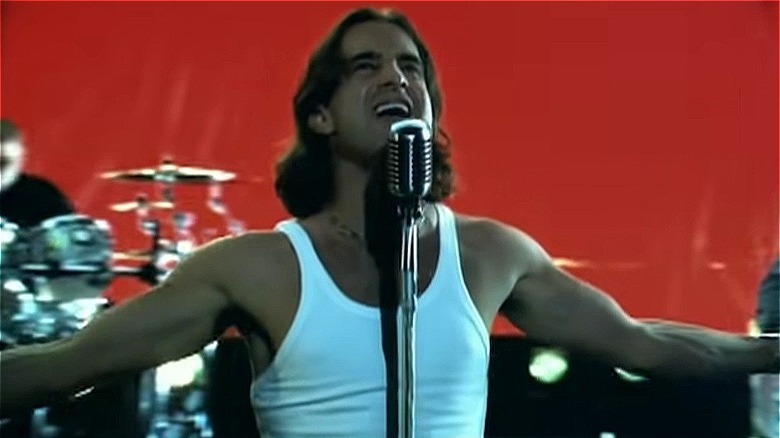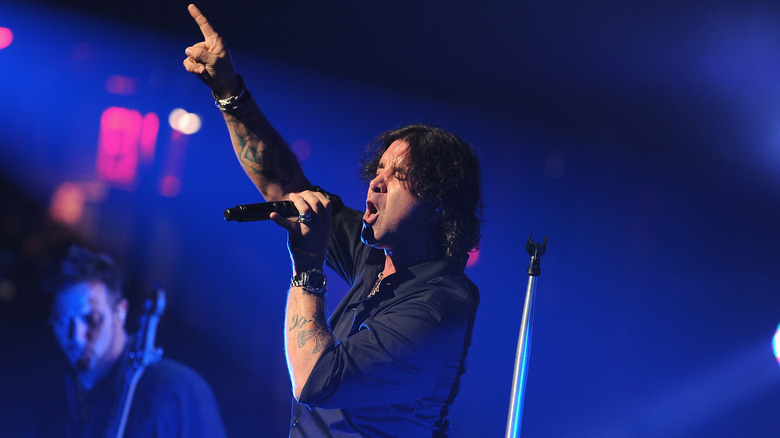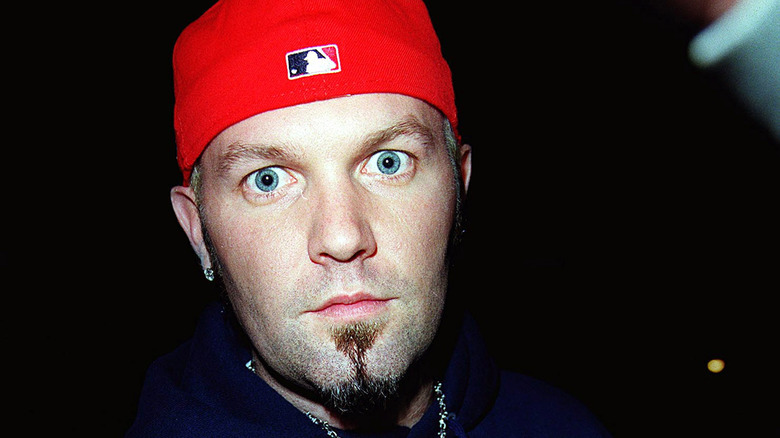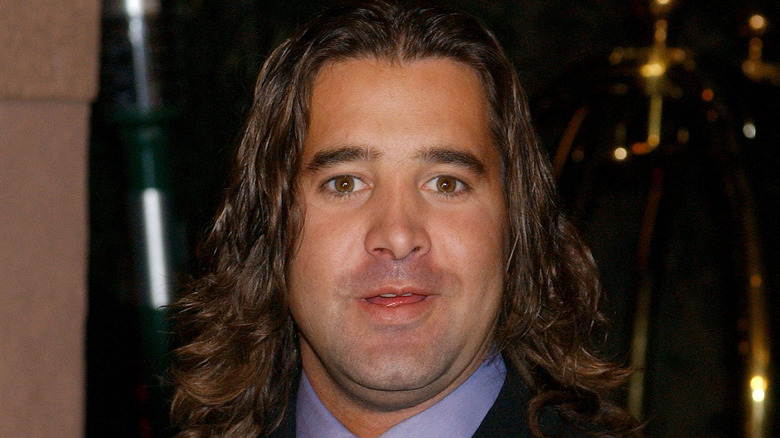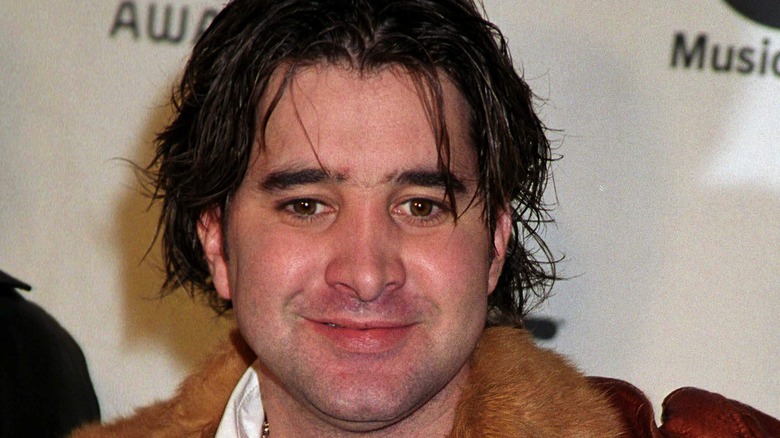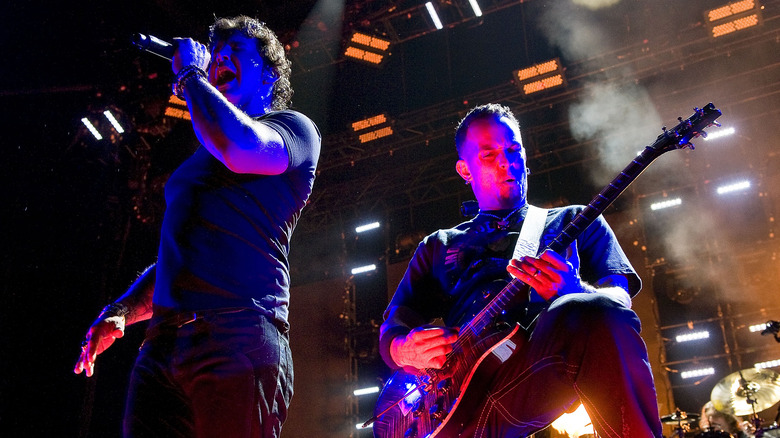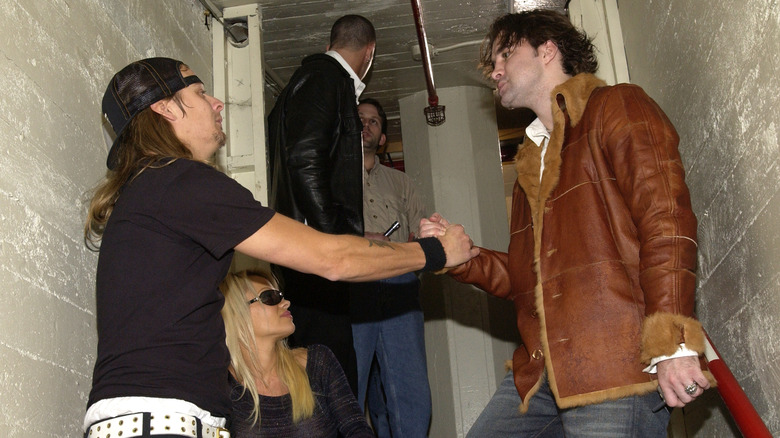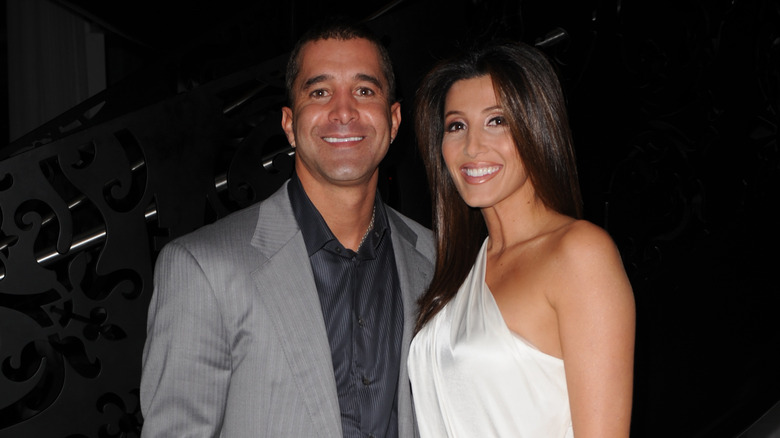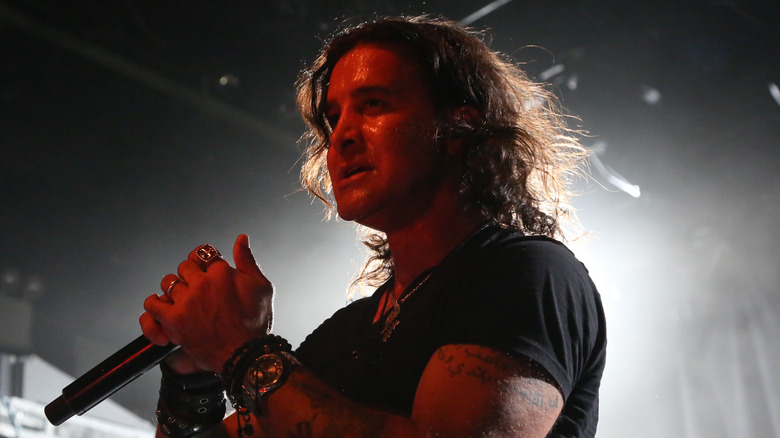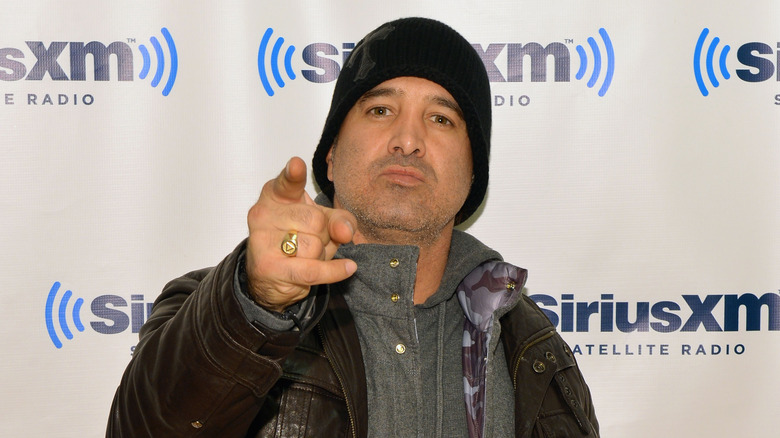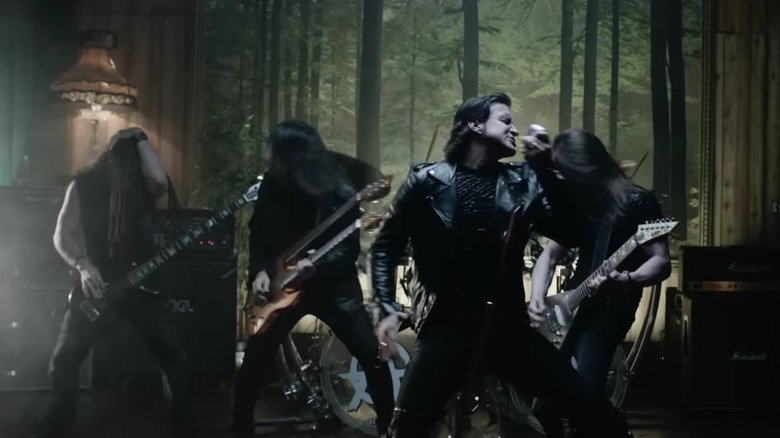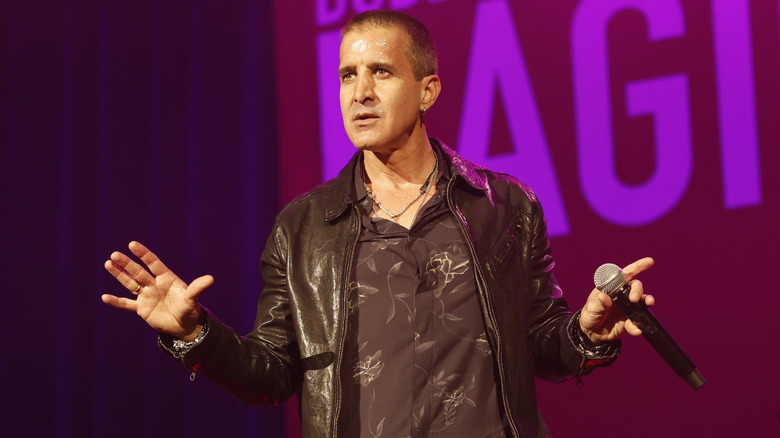How Creed Became One Of The Most Hated Bands In Music
What with the rise of artistic, lyrical rap music, grunge, and EDM, the early '90s were a pretty exciting time in popular music — a time when it seemed like new musical innovations were coming to the forefront roughly every 10 seconds. It can be argued, however, that no decade took a more swift and pronounced turn for the worse. In the late '90s, as lyrical rap was giving way to shiny suits and getting jiggy and EDM was still struggling to break through commercially, a new trend in rock began — the advent of a slick, commercial, faux-badass sound, employed by such maligned bands as Nickelback, Smash Mouth, Puddle of Mudd, Thirty Seconds to Mars, and others who would soon come to fall under the unfortunate banner of "butt rock."
In 2013, Rolling Stone polled their readers to determine the single worst band of the '90s, and the one that, er, rose to the bottom happens to be one that has sold over 30 million albums: Creed, the hard rock outfit fronted by complicated and often-troubled vocalist Scott Stapp. Formed in Tallahassee, Florida in 1994, Creed rode Stapp's lyrics and the compositions of guitarist Mark Tremonti to massive success in the late '90s and early aughts, and no amount of critical scorn — of which they received plenty — seemed to slow them down. But eventually, they became victims of their own success — and of Stapp's many personal issues — to become one of the most hated bands in all of rock.
Distant early warning
Manager and label head Jeff Hanson discovered Creed — composed of Scott Stapp, guitarist Mike Tremonti, bassist Brian Marshall, and drummer Scott Phillips — when they were just one of many Florida bar bands, and at the time, there wasn't much to suggest they'd soon be one of the biggest bands in the world. Speaking with Hit Quarters in 2010, Hanson revealed that the band was playing a small show at a bar he owned; they had no online presence, and played a set consisting almost entirely of cover songs. Hanson, though, was impressed with the two originals they had, so he called up a producer friend, John Kurzweg, who agreed to work with the band.
The result, recorded for all of $6,000 of Hanson's money, was an early version of Creed's debut album, "My Own Prison." Local radio stations began playing a few tracks, and within a couple of months, Hanson had managed to move several thousand copies. Major labels, however, were less than impressed. "Fourteen labels passed on Creed," he shared. "I was always prepared to do it myself ... even if a label signs it, they might just shelve it." Soon, though, he found a home for Creed in Wind Up Records, a small label that he says "had the same mentality" and approach to promotion that he did — which amounted to "Don't take a no for an answer." After giving the album a remix, Wind Up re-released it in 1997 — and it took right off, eventually selling a staggering 6.7 million copies.
One of these things is a lot like the other
Creed followed up their initial success with a bona fide juggernaut: "Human Clay," which went platinum 13 times over and spawned the No. 7 single "Higher" and "With Arms Wide Open," which went all the way to the top of the Billboard chart. No longer confined to the Modern Rock charts, Creed was now finding a wide audience — and as such, they were subject to broad criticism. Time Magazine, for instance, labeled the album "agreeable in a middle-of-the-road sort of way," which is hardly high praise — but that storied publication also pinned down a more succinct gripe, one which more than a few observers would echo. "Scott Stapp ... sounds like Eddie Vedder [of] Pearl Jam, reincarnated," its review read. "Which would be fine except that Vedder (pictured) isn't dead, so Stapp's vocal style comes across as a sort of ripoff."
This is an assessment that would follow Stapp around for decades to come, and all one really has to do is listen and compare the two singers to parse out why. Stapp, who is doubtless well aware of the comparison, was diplomatic when the subject of Pearl Jam's Rock Hall of Fame induction came up during an interview with Alternative Nation in 2017. "I think they're a great band, man," he said. "[Their debut album] 'Ten' was a great album. Full of great tunes and energy."
What a poser
Creed's very name has overt religious overtones, and a good deal of their lyrics could be interpreted as having a spiritual — or even explicitly Christian — bent; on breakthrough single "Higher," Scott Stapp fantasizes about "a place where blind men see," a "place with golden streets," which is far superior to this earthly realm, for example. (For the record, Stapp has said that the song is actually about lucid dreaming.) But if those overtones were unintentional, one would be hard-pressed to explain Stapp's infamous tendency to strike a pose — with, well, his arms wide open — which is highly reminiscent of Jesus Christ on the cross.
This tendency is well documented, and if Creed's lyrics could be seen as cringingly earnest, the Jesus posing just might have struck some observers as being a tad pretentious. Now, to be sure, there's nothing wrong with mainstream rock artists professing their religious beliefs; heck, the Doobie Brothers scored a Top 40 hit with "Jesus Is Just Alright," and unabashedly Christian outfit The Call even scored numerous mainstream hits with tunes like "Let the Day Begin" and "I Still Believe" (which was memorably covered by oiled-up sax man Tim Capello in the 1987 classic "The Lost Boys"). Indeed, every member of Creed identified as a Christian — and if they, and Stapp in particular, seemed eager to broadcast this to their audience, they were curiously reluctant to admit it.
Don't call them a Christian band
While the majority of their fans may not have cared, Creed's detractors were given plenty of ammunition by the fact that, despite Scott Stapp's obvious affinity for Jesus and tendency to employ Christian imagery in his lyrics, the band staunchly refused to be identified as a Christian rock band. On the one hand, this is kind of understandable; other than Christian hair metal outfit Stryper, no band willing to be identified by that label had ever really come close to mainstream success. On the other, some critics saw Creed as wanting to have their cake (being a Christian band) and eat it too (being broadly popular and selling millions of records) — typified by a 2000 critical analysis in The New York Times noting that the imagery in the band's lyrics "are the meat of Christian popular culture and have contributed to the band's phenomenal success."
Nevertheless, the members of Creed never strayed from the company line whenever the issue was raised. On the band's now-defunct website, Stapp himself sent down the statement: "We are not a Christian band. A Christian band has an agenda to lead others to believe in their specific religious beliefs. We have no agenda!" Speaking with CNN in 1999, Tremonti broke down his philosophy on the whole thing. "The Christian rock thing is a big misconception. It's not entirely wrong — we all have morals, but that's it," he said. "A lot of our music is focused on searching for spirituality and on the man holding us down."
Biting the hand they're ripping off
If part of what irked Creed's detractors is a perceived inability to respond honestly to criticism, then this was exemplified by an interview given by bassist Brian Marshall to Seattle radio station KNDD in June 2000, as the band was still riding high on the success of "Human Clay." In it, Marshall set out to address the notion that Scott Stapp's vocal style was, er, a touch derivative of that of Eddie Vedder, who was and is an absolute legend in the city in which he was giving this interview. Marshall opened his rebuttal by stating, "Eddie Vedder wishes he could write like Scott Stapp," at which point his next few remarks may have been drowned out by the sound of jaws hitting the floor all over Seattle.
Perhaps remembering where he was, Marshall backtracked, continuing, "I love Pearl Jam, but I just don't understand the route they took ... in their recent albums, [they've] gone in such a different direction, which is fine. But looking at their album sales and their fans, you can just see the decline" (via MTV News). Just a couple of days later, Stapp issued a withering statement on behalf of the other band members. "I don't understand why he said what he said, and I definitely don't agree with any of it," Stapp wrote. "Yes, we get tired of the [comparison], but there is no excuse for the arrogance and stupidity. I ask you all not to judge Creed as a band, because the statements made were not the band's feelings, they were Brian's." Less than two months later, Marshall departed the band.
An out-of-control ego and a weird feud
At a New Jersey music festival in 2000, there was born a feud between Creed and another band that has had its fair share of detractors: Limp Bizkit, and in particular, its frontman Fred Durst (pictured). While it has never been confirmed exactly what caused Durst to come unglued during Bizkit's set, he had more than a few choice words for Creed (which was on the bill that day) and Scott Stapp. "That guy is an egomaniac," Durst shouted at the crowd between songs. "He's a f***ing punk, and he's backstage right now acting like f***ing Michael Jackson." Apparently, Durst had been irked by the fact that Stapp was refusing to sign autographs — because shortly after Creed issued a statement denouncing his "immature and egotistical actions," Durst issued a terse statement to MTV News: "Creed should take a hint and spend more time signing autographs than writing about me."
Durst was not the only one to notice that Stapp's ego — and those of his bandmates — had become a touch inflated, and that Creed's work was suffering as a result. In a scathing review of their third album, 2001's "Weathered," Nathan Lichtman of the Badger Herald pegged the release as "a mild album by an overconfident band ... a sign that it's better to be humble and true to yourself instead of believing that you are bigger than everyone and everything." In 2017, Stapp acknowledged to GQ that he had been a bit full of himself during this period, saying, "I can't sit here and pretend and lie and say that fame and money doesn't change someone in their 20s."
Victim of circumstance
In early 2002, Creed was in the middle of a tour to support their third album, "Weathered," when Scott Stapp caught a bad break. While driving his SUV on a Florida highway en route to a video shoot, he was struck from behind by another vehicle; he would later explain to ABC Radio, "I'd just forgotten to put my seat belt on,and it threw me into my steering wheel and my head hit the windshield" (via ABC News). When police arrived, Stapp says that he was in shock and didn't realize he'd sustained injuries to his neck and back. As a result, police noted no injuries in the accident — which is where a slight controversy came into play.
In their coverage of the accident, MTV News simply reported that Stapp had been in a minor crash causing only about $1,000 worth of damage to his car, and that no injuries had been noted by responding police — but that Creed had, nevertheless, opted to cancel the remaining 20 dates of their tour. Stapp took this as MTV News calling him a big fat fibber, and he responded with vitriol in his ABC Radio interview. "For them to throw a spin and try to create some kinda controversy ... shows the lack of humanity, the lack of media integrity," he said. "I think that was deliberately wrong on their part. It showed malice in their heart toward the band and toward me, which they've shown from day one unless they want something from us." MTV responded to Stapp's remarks with complete silence.
Worst. Show. Ever.
In a 2006 interview with Rolling Stone, Scott Stapp would say that it was in 2002 — around the time that the "Weathered" tour commenced — that he was in the throes of a worsening addiction to alcohol and prescription medication (via Daily Beast). On December 29, 2002, those issues apparently came to a head in a big way when Stapp failed to show up for a concert in Chicago. Oh, he was physically present, and on stage — but he was absolutely somewhere else mentally, as he was so blindingly intoxicated that he was literally unable to sing a single word to any of his own songs.
The show was so legendarily awful that a group of fans filed a class-action lawsuit against the band, Ticketmaster, and the show's promoter, alleging that all of the parties involved were well aware of Stapp's substance issues, and that he was in no condition to perform that night — but that they essentially forced him to take the stage anyway, which was "tantamount to a cancellation" of the show. The lawsuit also mentioned a cheeky apology issued by the band in the aftermath, which expressed their hope that the fans in attendance could "take some solace in the fact that you definitely experienced the most unique of all Creed shows and may become part of the unusual world of rock and roll history!" The suit was dismissed in 2003, but the damage to the band's reputation had definitely been done — and Stapp was not in a space to make things any better.
Worst. Behavior. Ever.
In June 2004, it was announced that Creed had broken up; the non-Scott Stapp members would go on to form the band Alter Bridge with vocalist Myles Kennedy, while Stapp would get to work on solo material. In the meantime, though, the singer was in no way finished tarnishing his reputation with confounding displays of bad behavior, which ranged from simply obnoxious to actually aggressive.
As a sterling example of the former, he appeared on the Spike TV show "Casino Cinema" in a state that could only be described as "blind drunk," acting like a frat boy while trashing his former bandmates and Dave Grohl for some reason, and acting inappropriately toward Beth Ostrosky, the wife of Howard Stern, who was also taking part. In a fantastic example of the latter, he allegedly sucker-punched 311 drummer Chad Sexton during a drunken run-in at a Baltimore hotel in 2005, and in 2006, he was arrested after becoming belligerent while trying to board a plane at Los Angeles International Airport — an incident that didn't just take place shortly after his marriage to former Miss New York Jaclyn Nesheiwat, but while the newlyweds were actually en route to their honeymoon destination. Stapp cleaned up his act not long thereafter, and in a sit-down with Spin in 2009, he claimed to have turned over a new leaf, saying, "You know, each situation, and how it was covered, led me to finally making a permanent change in my life."
Please, not a sex tape
Of course, no years-long series of public meltdowns by a rock star would be complete without a sex tape, and so it happened that in 2006, one made the rounds featuring Scott Stapp and Bob "Kid Rock" Ritchie, on tour with Metallica circa 1999, enthusiastically engaging in pants-free activities with young women who may or may not have been exotic dancers. Given Stapp's long and public embrace of religion and morality, this had the effect of plopping a hypocritical cherry on top of his meticulously constructed jerk sundae, and in his conversation with Spin in 2009, he seemed appropriately mortified, saying, "What sucks about that is Bob — Kid Rock — and I were friends ... It's a time in his life and a time in my life that we'd like to put behind us and not publicize because we have children now."
This, unsurprisingly, does not line up with Ritchie's assessment of the situation in the slightest. Asked about the tape by Louder in 2016, he responded like the class act that he is. "I don't know what I was doing hanging out with Scott Stapp," he said. "I am the nicest guy in rock 'n' roll, because I hung out with Scott Stapp and got him some ... I'm like: 'Aren't you in a religious band?' But I was just trying to be a friend to him. He just seemed a little lost. I just figured if he hung around with a big dog he wouldn't p*** like a puppy."
Domestic violence is never endearing
In May 2007, Scott Stapp completed his descent to rock bottom with another arrest, and this time, it was not for any drunk and disorderly. Speaking with E! Online at the time, a Palm Beach County, Florida, Sheriff's Department spokesperson explained that Stapp had come home at eight in the morning after being out all night partying, and gotten into an argument with his wife that had ended with him throwing a glass bottle at her head (but missing, fortunately). The cops had been called, and after speaking with both parties, Stapp was arrested and charged with assault with intent to commit a felony, spending that night in the clink.
The charge was reduced to a misdemeanor, and Stapp agreed to jump back on the wagon and submit to a substance abuse evaluation, and also to take part in an anger management program. A few days later, Stapp issued a public apology that, amazingly, seemed to cast some of the blame for his actions onto Jaclyn: "I am truly sorry and seek forgiveness from my wife, as she has done the same seeking forgiveness from me," he said. "We both know we were wrong in how we handled the argument and in some of the allegations that were made" (via Spin). In December of that year, the charges were formally dropped, as Stapp had abided by all of the conditions of his release.
Hitting up the fans was not a good look
In 2009, Creed reunited for the album "Full Circle," which, while not hitting the heady sales numbers of their previous efforts, did well and seemed to satisfy fans. Stapp also released a sophomore solo effort, "Proof of Life," in 2013 — so it was a little bit surprising when, in November 2014, he released a series of Facebook videos in which he made some truly shocking assertions, the first of which being that he was destitute, homeless, and totally broke.
Shortly thereafter, an announcement came that Stapp was launching a crowdfunding campaign to fund the recording of his next album, and also the publishing of a novel he was working on — seeking a whopping $480,000 to complete these projects. However, The Hollywood Reporter was quick to chime in with a report which may have made fans think twice about contributing. In December, that publication revealed its findings that, according to its sources, Stapp had received a $1.5 million payout for "Proof of Life," on top of the $3 million he had split with the other three members of Creed for "Full Circle." By way of speculating where that money could have gone, THR quoted Jaclyn's attorney as pointing out that Stapp had resumed his habit of "going on drug binges and disappearing for days or weeks at a time," and dug up quotes that his bandmates had recently posted to Facebook expressing concern for his physical and mental health.
Wild conspiracy theories did not help
While nobody should be blamed or shamed for experiencing mental health issues, a series of Facebook videos posted by Scott Stapp unquestionably did further damage to his public standing. In them, he claimed in one breath to be dead sober, while in the next making assertions that appeared to be absurd: that all of his money had been siphoned off by mysterious parties who were stealing from him, that he was due royalties that were unpaid, and that the IRS had unilaterally frozen his assets, an action which any tax professional will agree cannot be taken without a specific and lengthy procedure being followed.
Around this time, Stapp's wife, Jaclyn, also filed for divorce, and her petition contained allegations that were even more troubling — that Stapp had claimed that he could talk to God, who was warning him about the DEA for some reason; and that he had sent rambling text messages about biological weapons being deployed in Florida, and musing about the possibility that Alcoholics Anonymous was a CIA operation. Fortunately, Stapp himself soon seemed to realize that there was something profoundly wrong. In May 2015, he told People magazine that he'd been diagnosed with bipolar disorder, and acknowledged that he had suffered a psychotic break due to his years-long abuse of alcohol and drugs. "In my delusional thinking, I thought my family was involved in ISIS, and that millions of dollars had been taken from me to support terrorism," he said. "All of it was nonsense. I was out of my mind."
Stapp ditches Creed for a new gig, then blows that gig
In 2017, fans unexpectedly found Scott Stapp sliding in to a new gig: as frontman for supergroup Art of Anarchy, which consisted of former Guns 'N Roses guitarist Ron "Bumblefoot" Thal, Disturbed bassist John Moyer, and twin brothers Jon and Vince Votta on guitar and drums, respectively. Formed in 2014 with former Stone Temple Pilots singer Scott Weiland on vocals, the band had found themselves in limbo when Weiland passed away in 2015, and in Stapp, they found yet another troubled but capable vocalist who could invest their heavy, crunching brand of rock with lyrical weight.
The band's 2017 album with Stapp, "The Madness," was well received, but soon, there came an issue: According to the other members of the band, Stapp showed very little interest in shooting videos, touring, or doing much of anything else to promote the project. This they alleged in a $1.2 million lawsuit against the singer, which also asserted that Stapp had been fronted $200,000 upon joining the band, and that his unwillingness to take part in promoting "The Madness" had cost the band potentially lucrative opportunities, up to and including a new recording contract. (It should be noted that a very similar suit had previously been filed against Weiland, who called the band a "scam," with that suit being unresolved at the time of Weiland's death.) Art of Anarchy does appear to have stalled out since the action was taken, and as of March 2023, it was being reported that the lawsuit is still ongoing.
Call it a comeback, sort of
In June 2023, Creed fans were stunned when it seemed the impossible was about to happen. Early that month, the band updated their Facebook page with a new logo, and their website was also updated with a new landing page featuring one heck of a pronouncement: "Are you ready? Creed is back! Sign up for upcoming announcements." It appeared that new music from the rockers might finally be on the way — but, you know what they say about appearances.
The following month, the band announced that they were indeed reuniting — but not for a new album, or even a new song. No, they were reuniting for a "Summer of '99 Cruise," a one-off concert that would take place aboard the Norwegian Pearl Cruise Ship in April 2024, on which they would be joined by other '90s bands such as Fuel, Buckcherry, and 3 Doors Down. September brought the announcement of a second cruise added to the itinerary — but again, no new music. Reactions from Creed fans on X (formerly Twitter) were mixed, to say the least. While some were stoked at the opportunity to see Creed perform live again, many thought the announcement didn't exactly live up to the tease. "Well that's a massive letdown," read one comment; "$2600 for the 'cheap seats,'" read another. "I guess I'm out." Many fans also expressed hope that the cruise would lead to another tour, or something — but this does not appear to be the case, as Scott Stapp has explicitly stated that the band has no further plans at this time.
Stapp admits that the band's image contrasted poorly with their reality
To his credit, Scott Stapp is ready to take every single bit of the blame for pretty much everything that went wrong with Creed. Speaking with comedian and podcaster John Crist on an episode of his podcast in early 2023, Stapp shared that his bandmates were always uncomfortable with the fact that, whether they liked it or not, Creed was perceived as a Christian band — and they were definitely not living a Christian lifestyle. "They didn't wanna be fake; they didn't wanna be hypocrites," Stapp said, before going on to explain that there was a difference between what the rest of his band was doing — partying like rock stars — and what he was doing. "I can own my part," he said. "I got mixed up in some things I shouldn't have that I go to a program for today. And that, I'm sure, was a major part, because had I not developed those issues, I think we probably could have worked through everything else."
As for whether there's any future for Creed beyond their upcoming cruise tour, Mike Tremonti adopted a "never say never" attitude while speaking with Hatebreed singer and podcaster Jamey Jasta in 2020. "I'm sitting on an entire Creed album," he revealed. "I have like really sketchy little demos of probably 13 songs ... Is it good enough for me to put everything on the back burner that I've been working on for the past 14 years? No ... Is it good enough to maybe 10 years from now? ... I wouldn't say no."
If you or anyone you know needs help with addiction issues, is dealing with domestic abuse, or needs help with mental health, contact the relevant resources below:
- Visit the Substance Abuse and Mental Health Services Administration website or contact SAMHSA's National Helpline at 1-800-662-HELP (4357).
- Call the National Domestic Violence Hotline at 1−800−799−7233. You can also find more information, resources, and support at their website.
- Contact the Crisis Text Line by texting HOME to 741741, call the National Alliance on Mental Illness helpline at 1-800-950-NAMI (6264), or visit the National Institute of Mental Health website.
